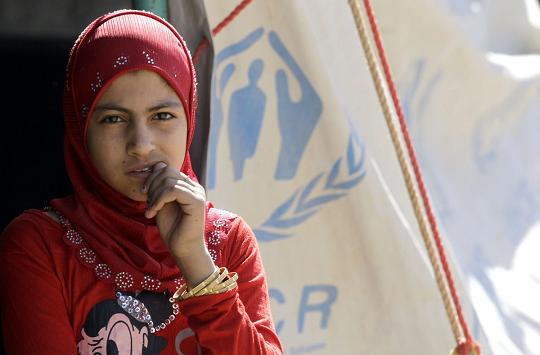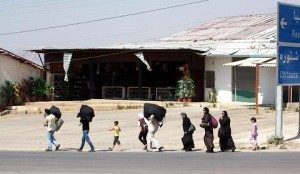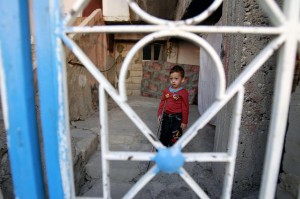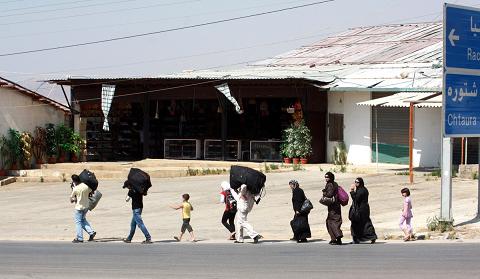The main destinations for Syrian refugees are the bordering countries of Lebanon, Jordan and Turkey. In the last three months alone the number of refugees registering with the United Nations High Commissioner for Refugees (UNHCR) in these countries has doubled, to a staggering total of over 300,000 individuals.

AFP Photo / Khalil Mazraawi
Increasingly though, refugees have ended up in Egypt. The latest UNHCR figure for registered Syrians in Egypt is 7,728 but the Egyptian government recently estimated the number of Syrian refugees to be 150,000. The UNHCR in Egypt said the government figure matches up with its own estimates.
There are a few reasons for the discrepancy between the number of Syrians in Egypt, and the number registered, said Ahmed Abughazala who works in UNHCR’s Cairo office. One reason is a lack of awareness that registration is possible, and Abughazala has been working hard to get registration units spread around Cairo and Alexandria to register as many Syrians as possible.
Still, there is resistance to those efforts as some Syrians are scared of having their names recorded, while others do not want the stigma of being labelled a refugee.
Some families are affluent enough to be living off their savings. That is not the case for 13 year-old Faiza and her family. They have no money and have been forced to beg throughout the Borsa, a series of outdoor cafes that are crowded around Cairo’s old Downtown stock exchange.
When we got to Faiza’s house, it was small, just one bedroom, one bathroom, and a living room filled with women and children. The first thing that struck me was how bare it was, and immaculately clean. “We clean all day,” said Faiza, who added that she rarely ever leaves the apartment.
The austerity of the apartment can be attributed to the fact that the family does not plan to stay in Cairo. They do not seem to be too fond of Egypt in general. “I can’t spend more than a year here, or I’ll go crazy,” said Suhailah, one of Faiza’s aunts, whose two youngest children crawled over her and an adjacent armchair as she spoke, “I have three children, but I won’t have anymore because things are so terrible.”
Despite the savagery raging in her homeland, she could not help but pine for it. She said that in Syria the streets are clean and the landscape is beautiful. In Cairo she feels crammed into a small space and there is noise all night so she is not getting enough sleep. In private Suhailah took off her hijab to show my friend Sara that large clumps of her hair has fallen out. She ventured a guess that it was the Egyptian water, seemingly unaware of the physical toll stress can take on the body.
Faiza’s mother Muneera is the head of the household and the night of our visit she held court in her living room while a small TV played looped news footage of the civil war in the background. Muneera has big hands and she stabbed her cigarette into the air with them as she spoke with the attitude and confidence of a woman who, for a year, has raised three kids by herself as her country descended into chaos.
Muneera showed us photos on her cell phone, photos of men with headbands holding up a Syrian flag. A photo of a girl with a shy smile, who, Muneera said, had lost her younger sister, older sister, mother, and father to regime killing.
On another day, Faiza and her aunt Kalila spoke frankly about the war.
“From the beginning of the crisis they closed the schools and the army occupied these places so that the soldiers wouldn’t be visible. Children are not going to schools anymore.” Faiza said.
“When the rain and the cold came we had to get wood and break down the doors and burn the clothes, anything, to stay warm. To keep the little children warm,” she said as if she was not a child herself. “The older ones are OK in the cold, but the younger ones can’t handle the cold. We used wood, clothing, anything we could to make the heating work to get warm. Back in Homs there was not a lot of goods available not even bread, sugar or tea.”
Faiza and Kalila said that when it came time to leave Syria, they chose Egypt because of the warnings coming from Syrians in Lebanon.
“There are pro-Assad people in Lebanon. There are many, many dangerous things like kidnappings happening to the Syrian refugees in Lebanon,” said Faiza.
Her aunt added, “They turn them over to the Syrian government’s authorities in Lebanon. We are scared to go there.”
The night of our visit to Faiza’s home a visitor arrived named Lamya, who showed us her Lebanese passport. Even with the passport, Lamya chose not to go to Lebanon. Lamya explained, “Hezbollah is the same as the Shabiha.”
Shabiha (ghosts) are the gangs of men who dress in black t-shirts, wear black boots, and roam the streets like hyenas to prop up the rule of Bashar Al-Assad in Syria. They are known to torture, rape, and murder anyone who shows signs of dissent.
There is no concrete evidence that Hezbollah and the Shabiha are interchangeable, said a Lebanese public policy analyst who asked not to be named, adding that the Syrian regime is not lacking “boots on the ground.”
However, Lamya’s words echo a wider Syrian narrative that Lebanon is a dangerous place for refugees. Certainly Hezbollah has maintained support for the rule of Al-Assad, one of the group’s greatest patrons. The Lebanese analyst said the main fault line in Lebanon at the moment is whether you are with or against the Syria-Hezbollah axis.
Syria and Lebanon have an intertwined and bloody history. In recent weeks there has been evidence of Syrians being beaten by the Lebanese army and Syrians being kidnapped by Lebanese militias. A bombing last month that killed an anti-Syria police chief was a reminder that Lebanon always seems to be a hair’s breadth away from a return to war itself.
***

AFP Photo / Stringer
An alternative to Lebanon for many refugees has been Jordan. So many refugees have fled to Jordan that the Zaatari border refugee camp has had to expand to the point that it has nearly doubled in size since early September. While Zaatari has expanded, Syrians have repeatedly protested against the conditions in the camp, at one point even burning some of the tents.
“Zaatari camp is in the desert, so there is sand in your hair and your mouth, you will be covered by sand. There is no water and food sometimes rots because of the high heat,” said Taher, a Syrian refugee in Cairo who spent some time at Zaatari. Worse than any amount of sand in his hair, was the humiliation Taher felt in Zaatari
Humiliation was a consistent theme in Taher’s story, a story that started when Taher tried to go to Lebanon, where he has citizenship.
“I was trying to escape to Lebanon, in a legal way. But they arrested me. They take you to jail, but they don’t beat you: being in jail, it’s enough. It’s not jail as you’re imagining, it’s worse.” Taher gestured around his living room and said it was about the same size as his prison cell, except there were 40 other people there with him. He said he sat all day with his knees pressed to his chest and if he wanted to sleep he laid on his side with his knees still pressed to his chest.
“That’s the worst experience I’ve had in my life.” He eventually broke, and told the prison guards that he would join the Syrian military.
“So after they humiliate you, they take you to the military to defend the humiliators. Even when you’re in the military they humiliate you, every day, every day, every day. You are something like nothing. You are nothing, you are only the soldier of god, and god is the president.”
He stayed in military training for six months. After that, since he had a college degree, they made him an officer and assigned 20 soldiers under his command.
“So after six months of humiliation, you need to be a leader now. But you are not a good leader at all, because you don’t think in that way. You think you are nothing.” He said that his men were completely subservient to him, but it just made him laugh. Taher was a critical thinker, processing the power dynamics and subtlety of interpersonal relations of those around him. Those are bad qualities for a soldier.
Taher managed a logistical unit, sending vehicles here and there with food and fuel.
It was mundane, but even his peripheral involvement with the regime was something Taher never wanted to be a part of. “It’s not your army,” he explained, “it’s not an army for the state, it’s an army for the dictator.” So he made the risky decision to defect. “It’s so dangerous. If they catch you, they will send you to jail for maybe 21 years, after they beat you for two months. That’s if they will be kind. If they will not be kind, they will kill you.”
So he joined the Free Syrian Army, it was the only place he could feel safe, even though his unit was bombed day and night.
He liked the men with him in the FSA, but still, he knew he was not a soldier. “I can understand killing, but I cannot kill.”
Then in an accident, Taher was shot in the leg. It was not severe, but it was enough to make any further contribution to the FSA impossible and it sealed his decision to leave for Jordan.
“When I got to Zaatari, they led me to a French hospital. I was with one guy who had a crushed shin and femur, and one guy had no arm. There are four guys and they are all screaming, screaming. The ambulance came to the hospital and they opened the doors. One French nurse was looking at us. We asked, ‘can we get out?’ She said, ‘wait, I’ll call the doctor.’ After five minutes he came,” Taher mimicked the doctor scratching his chin in contemplation, then pointing, “’that one.’ It was so cold blooded. After one hour he came back and said, ‘the second one please.’”
Because his wound was relatively light, Taher quickly left the hospital and entered the camp. He was given a volunteer position with the UN based on his previous experience working with children. With the UN he encountered the same patronising attitude of the French doctor.
The manager of UNICEF in Zaatari, (Taher guessed that he was British) spoke with a distain for the Syrians. “’I haven’t seen refugees as bad as this,’” Taher quoted him as saying. “’They are such bad refugees. Even in Burkina Faso they are not bad like this.’”
The final dose of humiliation came after Taher finally secured a plane ticket to Cairo. Even with his ticket in hand, the UN wanted to make sure Taher was leaving the country. They made him pay for a taxi from the border to the airport and an officer travelled with Taher from the camp to the door of the airplane. “It is something like being a prisoner. It is something like humiliation. I am a good person, believe me I will not run away. I am not a criminal, I am just a Syrian refugee.”
When a friend met him at Cairo airport, Taher broke down in tears.
Confronting humiliation is at the heart of the Syrian revolution said Salma Gazayerli, a Syrian activist living in Egypt. “Our revolution was mainly about dignity and freedom. In Syria, even though there is a discrepancy between different classes, the revolution was not as much about economics or poverty or bread like in Egypt. It was about dignity.”
***
Hamdy wanted to work. He was one of the best students in his class at Damascus University and earned a degree in Business Administration. Despite his abilities, he still had to take five years to graduate.
“I failed on purpose,” said Hamdy. “I was going to graduate, but that would mean I’d have to join the army. So I did badly on my exams. I thought, one more year and the war will be over.”
But that was not the case. The war was still raging and Hamdy’s conscription date was rapidly approaching. He talked to his friends living in Lebanon, but they told him that in the extra year he had stayed at university, things had deteriorated for Syrians in Lebanon and it was not worth going. So he travelled to Jordan, but he was turned around by the Syrian authorities and told to go back to Damascus.
He completed his degree, but by then the Jordanians were turning refugees back at the airport and at the border. This made Turkey the next obvious choice.
In many ways, crossing into Turkey is to cross into a different world. To leave the Arab world behind and enter a world with a different culture and a different language, this poses a particular challenge for those who want to work.
“We can go there, but we don’t speak Turkish,” said Hamdy. “I don’t think that I could have a job if I am not speaking the language of the country.” It is also expensive, which makes the necessity of work even more important.

AFP Photo / Anwar Amro
Even for those more desperate refugees, who do not have the luxury of applying to management positions overseas, Turkey is becoming a less welcoming option. Turkish Foreign Minister Ahmet Davutoglu, normally a man who is up for any diplomatic challenge, has been overwhelmed by the influx of Syrian refugees and told the UN that Turkey is reaching its capacity.
The Turkish camps could also see an influx due to recent clashes along the Syrian border between Kurdish nationalist fighters and Al-Qaeda linked Jabat Al-Nusra fighters, in an area the Syrian military has long since abandoned.
Hamdy ended up in Cairo, where he said he had received a few job offers, but plans to take a job in Oman if he can secure a visa now that he has proof of employment.
***
Syrians are coming to Egypt in droves for a few reasons, according to Mohamed Dayri, the UNHCR country director. “Egypt has offered interesting conditions. First of all, there is no encampment position. So they are allowed to live in the city and Syrians would prefer to come to urban centres.”
“Egypt also offers a visa free regime,” continued Dayri. “Syrians have been extended one year residence permits. They get a stamp fixed on their passport on arrival, and it gives them one year of residence.”
Finally, said Dayri, “Egypt has also announced that it would admit Syrian students into public schools and this has been extended to university.” This provision has taken effect and Syrian students are showing up in classrooms at all levels of the Egyptian school system.
However, the sustainability of Egyptian support is easy to question. The Egyptian government is currently facing a domestic tumult, in addition to the challenges embedded in both Egypt’s economy and education system.
Even Dayri, who is aggressively optimistic about Egypt’s assistance efforts, admits that the situation “poses challenges, to both the Egyptian government and the international community.”
Hamdy feels that the international community has betrayed the Syrian people. In particular, Hamdy directed his ire at Gulf countries, which he said it is almost impossible to get into. “They are saying that they are the Syrian people’s friends. They are trying to help Syrians, they always talk about it in the media. Then why are they not doing anything? How can you help someone? Just give him shelter and let him work. I’m not looking for sympathy.”
In this vacuum, Egypt has offered a refuge, even if it is a precarious one. “It was a long, bad year,” said Taher. “After all these bad experiences in Syria, and in the Syrian army, and my injuries in the FSA, and crossing the border, and also Zaatari camp, all that shit.
It was a really bad experience. So I come here to Cairo and the employees at the airport were so kind. They say, ‘are you Syrian? Yes? Ahlan wa sahlan [welcome].’ I’m relieved now.”
The only thing that can comprehensively address the crisis of Syrian refugees is an end to the war itself. Until then, Faiza said, “It is better that we escaped the war. At least we managed to come here with our souls alive. Nothing else matters. Money comes and goes and our homes come and go, but our lives are irreplaceable.”




